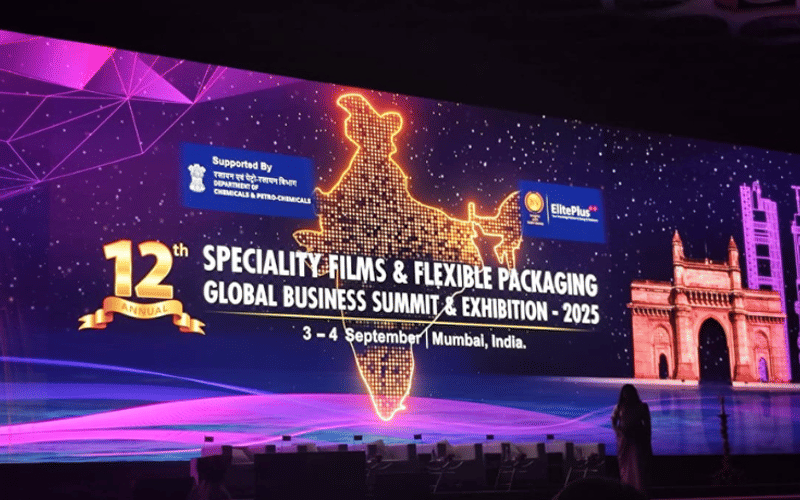ElitePlus Global Summit: Panel Discussion on brand owners’ perspectives on the new normal
Moderated with a focus on realities, the panel made it clear that sustainability is no longer a matter of compliance, but a business continuity imperative.
08 Sep 2025 | By Sai Deepthi P
At the 12th Speciality Films & Flexible Packaging Global Summit & Exhibition 2025, the third panel discussion explored how brand owners are navigating the “new normal” of packaging. Moderated with a focus on realities, the panel made it clear that sustainability is no longer a matter of compliance, but a business continuity imperative.
Yogesh Bambal, senior leader - R&D, Mondelez International, set the tone by emphasising the company’s progress. “If I have to talk about packaging sustainability, it’s twofold, design for recycling and reduction of virgin plastics. Globally, 96% of our packaging is now designed for recycling,” he said, adding that India was in good shape with several rPET-based products already commercialised.
Sharmishtha Bade, vice president - procurement, Pernod Ricard, reinforced the shift from compliance to core strategy. “All that we do in packaging, we keep sustainability at the heart. Three years ago, we exited monocartons, using them only where relevant. It’s no longer a compliance tick mark but a business continuity imperative,” she said. Bade pointed out that reducing waste and ensuring sustainable design compliance were her team’s priorities, alongside working with supply partners to explore PCR materials safe for food and beverages.
Geetanjali Vats, global plastics sustainability, Asia and ANZ lead, Hindustan Unilever, widened the conversation. “At Unilever, we are working to bring plastics back into packaging while ensuring recyclability. Standardising visual identifiers for recycling can be both an opportunity and a technological leap. Our four goals go hand in hand, climate, nature, plastics, and livelihoods,” she said, urging long-term implementation and greater collaboration across the ecosystem.
Saurabh Jhawar, head - product supply organisation, Godrej Consumer Products, shared how the company has already introduced recycled packaging for leading products like Good Knight mosquito repellents. “We are committed to CAD1 and CAD2 categories, though CAD3 remains a challenge. Brands are shifting to PCR partly because of competitive pressure. The key is making the technology cost-effective so that more brands can adopt it,” he explained.
Swaran Singh Grover, director R&D, South Asia, Kellogg’s, returned the focus to affordability. He made a crucial point that, “Only a handful of players can produce PCR and recycled PET at scale in India, especially those that are food-grade compliant, and hence passing costs to consumers is not viable.” He also stated that food and pharma-grade PCR needs careful development, not knee-jerk solutions. “Even incremental improvements of 5% a year in quality would be meaningful,” he said. He urged the industry to look beyond raw materials and costs, to efficiency and waste reduction in sustainable packaging.
Sowmya Chakraborti, senior leader packaging, Reliance Consumer Products, highlighted both challenges and opportunities in materials innovation. “Today it’s difficult to match the barrier levels of multilayer plastics, but we are prepared because government mandates are driving innovation. Polyethylene has become so advanced that segregators often cannot tell multilayer packs apart. Visual identifiers could help, provided they don’t add unnecessary ink costs,” he suggested.
Throughout the discussion, the theme of visual markers for packaging recyclability surfaced repeatedly. The idea was to make it easier for waste segregators to distinguish materials at end-of-life, helping India’s recycling ecosystem. Summing up the panel, the speakers agreed that cost remains the toughest hurdle, but sustainability cannot be postponed. Whether it is Mondelez achieving near-universal design for recyclability, Pernod Ricard embedding sustainability into business continuity, HUL linking plastics to broader environmental and social goals, Godrej adopting recycled packaging in household products, Kellogg’s urging caution with PCR, or Reliance calling for smarter identifiers, the consensus was clear: the new normal for brand owners is to deliver packaging that is sustainable, safe, affordable, and scalable.


